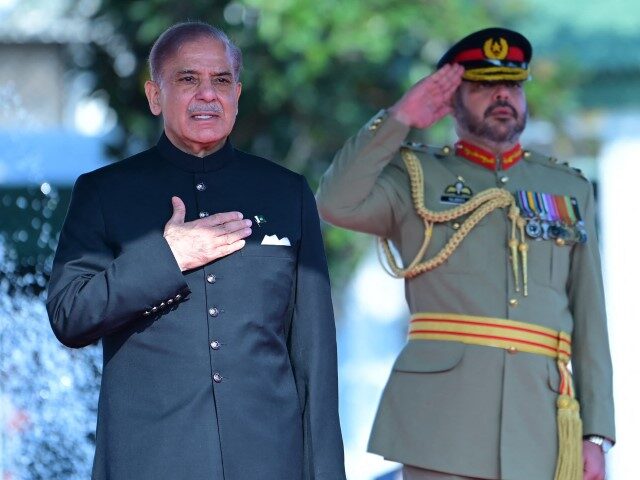
Former Pakistani Prime Minister Shehbaz Sharif was sworn in for another term on Monday, despite opposition protests and allegations the February election was rigged to keep former PM Imran Khan out of office.
Sharif, 72, is the younger brother of yet another Pakistani prime minister, Nawaz Sharif. The 2024 election was supposed to be Nawaz’s chance to rise from the ashes after he stepped down amid corruption allegations in 2017 and spent some years in political exile. Nawaz Sharif enjoys the unique distinction of being Pakistan’s longest-serving prime minister, even though he never completed any of his three terms in office.
Nawaz Sharif’s comeback was driven partly by the powerful Pakistani military establishment turning decisively against Imran Khan, the populist Islamist leader who was himself booted from office by a parliamentary vote of no confidence in April 2022. Khan has been jailed and banned from politics on several of the hundred-plus allegations of corruption and misconduct haunting him since his ouster, but he remains the most popular politician in Pakistan.
The military reportedly turned to Nawaz Sharif as its best chance of beating Khan and his Pakistan Tehreek-e-Insaf (PTI) party, fearing incumbent PM Shehbaz Sharif would not be able to get the job done after a lackluster term with growing popular discontent. Nawaz accordingly returned from his self-imposed exile in London and even declared victory after the election in early February.
The election delivered a nasty surprise for Sharif and his PMLN party in the form of a remarkably strong showing by PTI, which had to run its candidates as “independents” because it was stricken from ballots by court order. PTI leaders alleged the election was rigged to prevent it from winning the single-party majority it needed to form a government on its own and thousands of its supporters demonstrated in the streets for weeks after the election results were announced.
PTI lawmakers and their allies were still protesting as Shehbaz Sharif was sworn in for a second term on Monday. Pakistan’s election rules required him to resign and dissolve his government so elections could be held, so he was technically returning to office rather than remaining as a re-elected incumbent.
Shehbaz ended up with the job again because Nawaz Sharif reportedly did not wish to preside over a minority government. PTI was the big winner in the legislative elections by a sizable margin, so PMLN had to form an uneasy alliance with several other parties to muster the votes needed for the prime minister’s seat.
The speaker of Parliament, Ayaz Sadiq, announced on Sunday that Sharif Shehbaz won 201 votes from the assembly to become prime minister, passing the 169-vote threshold needed to win and besting closest competitor Omar Ayub, who won 92 votes.
Ayub belongs to a party called the Sunni Ittehad Council, but he was actually the candidate of PTI and its slate of “independent” legislators. PTI did not have 169 votes on its own – although it contends it would have if the election had not been fixed – and could not form a coalition that could prevail against Sharif’s alliance.
Sharif said in his acceptance speech on Sunday that his party was “subjected to political victimization in the past, but never took any revenge.” This was interpreted as a slam at the vengeful Khan, who has been accused of abusing the Pakistani justice system to imprison his political enemies.
Sharif more openly blamed Khan’s supporters for attacking military property when they rioted after his arrest last May and hinted that his government would consider pardons for the perpetrators.
“I am offering you reconciliation. Let us sit together to work for the betterment of Pakistan,” he said to the opposition.
While Sharif was speaking, Khan’s supporters in Parliament waved posters with his picture, shouted “Shame!” and “Vote thief!” at Sharif, and hooted with derision when he offered reconciliation. Sharif denounced them for disrupting the parliamentary session.
Ayub, in turn, gave an address to parliament in which he referred to Imran Khan as “my leader” and praised his “bravery” for standing up to the politicized prosecutions against him. He asserted “votes were stolen” to make Sharif prime minister again, and criticized Sharif’s government for arresting Khan supporters after their demonstrations.
Ayub said Sharif would never be able to ‘win hearts and minds” in Pakistan because “he came to power through a rigged vote.”
Soon after he was sworn in, Sharif ordered Finance Secretary Imdad Ullah Bosal to expedite negotiations with the International Monetary Fund (IMF) for a bailout. Sharif negotiated a $3 billion loan with the IMF during his previous stint in office, but it ran out in April.
Khan wrote a letter to the IMF from prison last week, urging the international fund to withhold some financing from Pakistan until a full audit of the challenged 2024 election is completed. The letter sparked a bitter feud between Khan supporters and opponents, who blasted the imprisoned former PM for interfering with the country’s financial arrangements.
